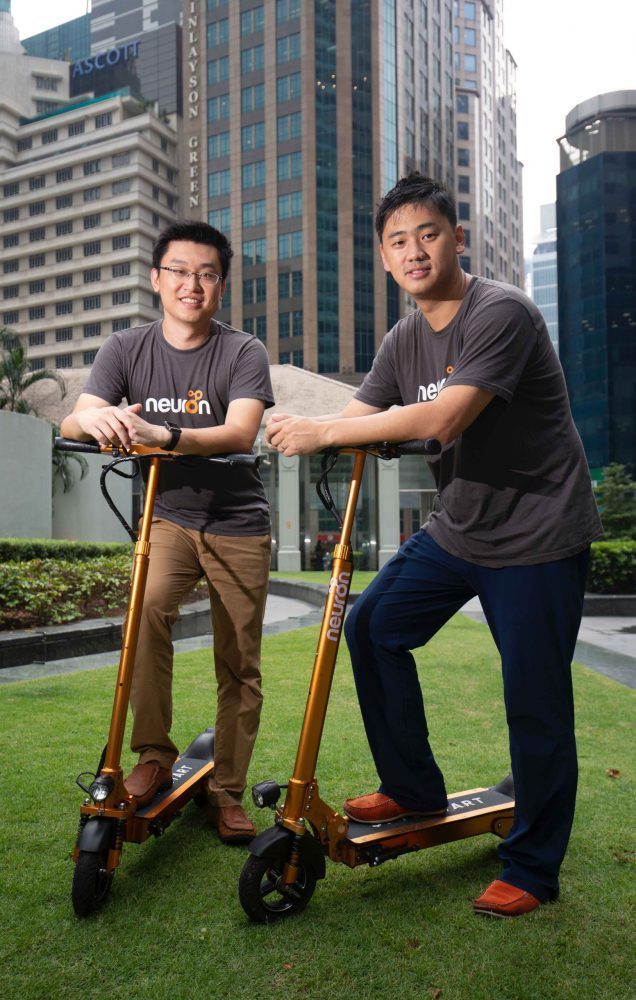Disclaimer: This entry is part of KrASIA’s collaboration with Project Alpha of Amazon Web Services (AWS) and Singapore-based venture capital firm SeedPlus, featuring high-potential startups in Southeast Asia.
When Singapore-based Neuron Mobility ventured into Bangkok earlier this year, its co-founder Zachary Wang often received the question: “How and why will electric scooter sharing work in one of the world’s most traffic-congested cities?”
With Neuron’s e-scooters, Wang told KrAsia that people can “zip through traffic with convenience and comfort.”
“Electric mobility is going to be a clear winner in the short distance mobility space,” Wang said, “We believe that in the next five years, e-mobility services are going to be ubiquitous in all major cities around the world.”
Founded in 2016, Neuron Mobility has been one of Singapore’s home-grown stars locally and in Southeast Asia’s personal mobility device (PMD) space. In December 2018, Neuron raised USD 3.6 million in a seed funding round that was led by SeedPlus and 500 Startups to bring its e-scooters beyond Singapore’s borders.
The new funds paved the way for Neuron to launch its first commercial-grade e-scooter that was designed in-house to meet UL certification and improve its software platform to better guide riders to designated parking zones.
UL certification is awarded to electrical mobility devices that have met the standards of a comprehensive system of safety tests. It is hoped this will help reduce any possibility of poorly installed or manufactured batteries from catching fire.
These improvements were part of the reason why Neuron Mobility was confident in tackling other Asian cities that were vastly different from Singapore in terms of urban infrastructure. Neuron’s e-scooters have now also appeared in Bangkok, Chiangmai (Thailand), Cyberjaya (Malaysia) and Brisbane (Australia), where the city council recently awarded Neuron a 600-scooter contract.
As Bangkok was the most densely populated of the four cities, Wang said that Neuron did not take a “blanket approach” to the city and its team had to analyze areas where e-scooters could be most beneficial to riders. A part of the Thonglor neighborhood in Bangkok was chosen for the launch back in January because the sidewalks there are good enough it’s close to public transit stations.
The firm is expanding its services to other areas in Bangkok with large footpaths.
Wang acknowledged that e-scooters cannot and should not replace motorbikes or the tuk-tuk on Bangkok streets. However, the city’s public transport system does not reach every corner. E-scooters can give people an effective option to ride to train and bus stations.

Over the past six months, Neuron said it has launched about 700 scooters around Bangkok and has served more than 200,000 trips.
In Thailand, the team took some time to educate and train users on the e-scooter’s new features, as well as on the need to park in designated areas. This is critical for e-scooters to avoid the same fate as bike-sharing in Singapore.
While initially well-received, pedestrians began complaining to ride-sharing over bikes being abandoned, blocking pathways, and being thrown in canals. This led to the Singapore Government to introduce parking and usage regulations that ended up hampering usage and adoption.
In Singapore, Neuron charges people additional fees if they park their scooters in the wrong places. While this has yet to happen in Thailand, Wang is confident that Neuron’s tight control of all operational processes in combination with reaching out to users regularly can minimize the issue of vandalism and unwanted parking.
“We are able to track things from our scooters’ real-time GPS location, to battery status, and even whether the scooter has fallen on the ground,” Wang said. “The real-time connectivity and control gives us the opportunity to optimize our operations and improve profitability.”
Thailand does not yet have regulations on the number of e-scooters a ride-operator can have in its fleet. Singapore’s Active Mobility Act has capped the fleet size of e-scooter operators from 200 to 500. Neuron Mobility is awaiting for a license from Singapore’s Land Transport Authority to operate a device-sharing service in public places, which is mandatory for all providers of such service by 2021.
Wang said such regulation is “inevitable” and also reflects the Singapore Government’s acceptance of the service. “We hope Singapore’s regulation serves as an example to encourage other cities in the region to update the regulations and embrace this new mode of mobility,” he added.
This article is part of KrASIA’s “Startup Stories” series, where the writers of KrASIA speak with founders of tech companies in Southeast Asia.
